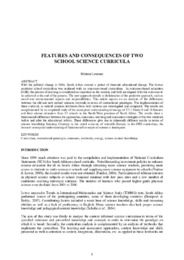Features and consequences of two School science curricula
Abstract
With the political change in 1994, South Africa entered a period of dramatic educational change. The former
positivist school curriculum was replaced with an outcomes-based curriculum. In outcomes-based education
(OBE) the process of learning is considered as important as the content, and both are aligned with the outcomes to
be achieved at the end of the process. The new approach attends to deficiencies of the positivist approach, such as
social and environmental aspects and responsibilities. This article reports on an analysis of the differences
between the old and new natural sciences curricula in terms of instructional paradigms. The implementation of
these curricula in natural sciences textbooks from both systems are investigated and compared. The results are
complemented by an empirical study of the conceptual understanding of energy of 1211 Grade 9 and 10 learners
and their science educators from 33 schools in the North-West province of South Africa. The results show a
fundamental difference between the approaches, outcomes, teaching and assessment strategies of the two curricula
before and after the educational reform. These differences give rise to inherently different results in terms of
science knowledge learning. Contrary to the stated outcome of scientific literacy in the OBE curriculum, the
learners' conceptual understanding of fundamental concepts of science is inadequate.
